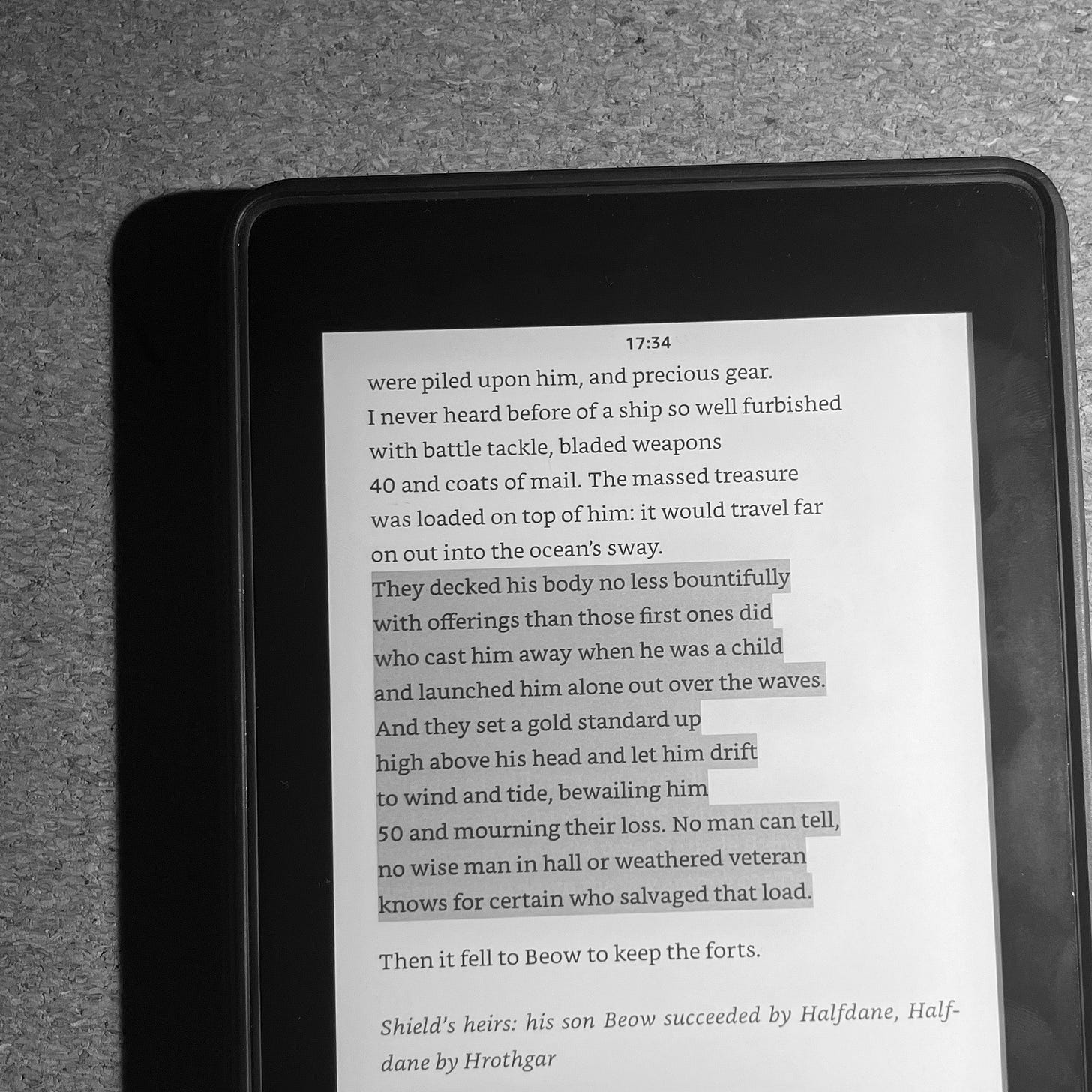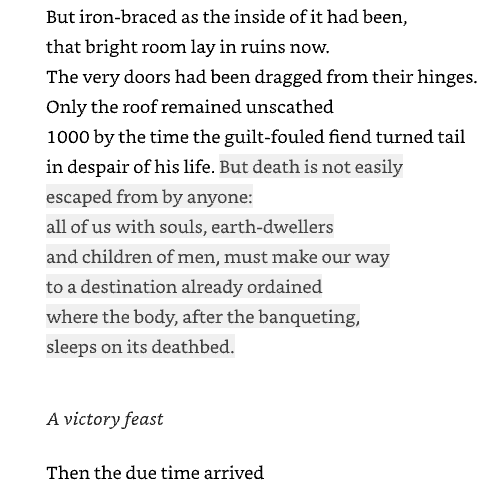Beowulf: A New Verse Translation by Seamus Heaney
A death song that makes you feel the core of humanity and the beauty it holds.
Dear Reader,
Hope you are keeping well. This weekend I had the absolute pleasure of reading "Beowulf". Yes, Beowulf, and it's THE Seamus Heaney translation.
Beowulf is the oldest surviving long poem written in the English language, most likely from between the 6th and 10th centuries (Old English, of course, from Anglo-Saxon England). Although the story likely existed in oral form earlier, the author and source remain unknown to this date.
I loved how Heaney has poured his heart and understanding of poetry and language into every line of this translation. It's just very beautiful. It is a challenging read though, because he infused Old English with Irish lyricism and our modern emotional depth.
If I have to tell you about how I felt reading this wonderful piece of text, this is it. If you strip away all the fancies, ego, pride, greed, and everything from the essence of a human at its core - what you are left with is what reading this made me feel or experience.
I do not know if it's the story or if it's the translation (because I did not read the original text) that made me feel this way. It was just so beautiful, I can't tell you that in words; only the great Heaney could do it.
Sometimes I was left speechless, just trying to comprehend or feel the beauty he has put in this translation that made me experience the human core. Absolutely genius, brilliance!
It is not just English literature, but understanding human heroism and limitation, that too coming from those old times. As Heaney says in the introduction, “it speaks to our moment as powerfully as ever: it dramatizes the fragility of civilization, the dignity of courage, and the certainty of death”. The foundational.
Short summary of the story: In Great Dane (now Denmark), there is a tight-knit community of warriors who live together in a great mead hall, looking out for each other like family. One day, a monster named Grendel starts terrifying them, literally eating people at random. Nobody could stop him. Until Beowulf, a brave warrior from Geat (now Sweden), hears about their plight. Despite knowing that everyone who faces Grendel has met a horrible end, Beowulf still steps up to help. He not only defeats Grendel but also takes on Grendel's mother who seeks revenge for her only son (she fights with a purpose though, not to destroy civilization but to avenge her child), and thus saves the Danes from the terror. The story ends with a final battle between Beowulf in his old age and a dragon, where he kills the dragon but eventually dies due to battle injuries. The poem ends not in victory but in vulnerability.
“Fate goes ever as fate must” - Beowulf
What really touched me about this story is how it reminds us of what truly matters in life: kindness, courage, and doing the right thing. We all have to face our mortality someday, but it shows us that we have a choice in how we live and face our challenges, meaning, we don't have to let our "monsters" defeat us.
It said to me that glory is brief, that monsters are sometimes ourselves. In the story Grendel is the loathing joy he cannot share, that is exclusion; Grendel's mother is the vengeance driven by grief, similar to human retaliation; and the dragon represents greed, and no control on time, that is old age, or death.
Albeit after Beowulf's death, his people fear invasion. In Beowulf's and our world where it is ruled by fate and war, peace is just a pause between clashes. There is some sort of trouble or dispute every couple of years, and peace just sits in between these triggers.
The leaders, treaties, and rules, they are not a permanent solution but a fragile center just holding chaos at bay. Like many nations today, Geatland (Beowulf's kingdom) rests on a hero, not a system.
The poem even begins and ends with funerals. I felt it is less about the dead but more about the living who must carry the memory forward, like a cycle. But the sad thing is, not just in the poem but the reality we live in, with the futility of legacy (be it of humans, countries, etc.) history is swallowed by the next war. Fragile, and easily drenched by new blood that comes next.
There were a number of times I wondered if Beowulf was brave or obsessed with reputation. But it also quite often spoke about the fragility of our mortal time, then it makes me think in a world without eternal life, where fate is fickle, reputation can be considered immortality.
Wars and heroism are both edges. It wins honor but also leaves people leaderless or defenseless. A currency paid in blood. I would surely call the whole story/poem not a warrior's tale but a death song.
Until next time, with you in thought,
Yana






